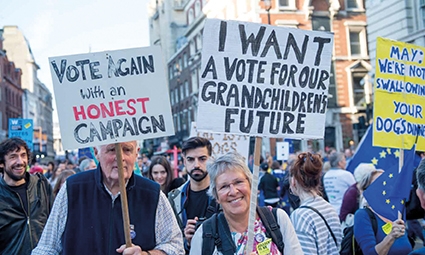Why I Hate Brexit
I speak three of its languages and made its cities my home. Its food fills my fridge and its wine, my glass. I count its people as close friends. Our nations' histories and cultures are intertwined. Its golden letters on my passport form part of my identity. I am proud to be a citizen of the European Union. My citizenship connects me to a wider European community. It guarantees me rights and freedoms. And now it’s being stolen from me.
I, like many others from the UK, are angry about Brexit, a helpless situation sealed by the voice of 37% of the population. The decision to strip the entire population of its EU citizenship was posed by a simple question of “in” or “out”. Misinformation and a lack of education ensured that the outcome would be far from fair.
During the referendum campaign, it was impossible to understand what leaving the EU would actually mean for the UK. Even now, 20 months later, and after the exit agreement has been approved by the EU, I don’t fully understand what Brexit will mean for myself and my country. There is a huge lack of education on the role of the EU in the UK, to the point where the second most googled search term in the hours following the referendum on 23 June 2016 was “what is the EU?” A bit late, don’t you think?
A lack of education was made worse by a lack of proper information on what it would mean to leave the EU. The Leave Campaign claimed in their publicity that ‘Turkey (population 75 million) is joining the EU’ which is far from likely, while the statement “we send the EU £350 million a week, let’s fund our NHS instead” was paraded around the streets of London on the side of a bus. The Center for European Reform recently published a study that Brexit has cost Britain £500 million a week and Boris and Farage, the lead voices of the leave campaign, are conveniently nowhere to be seen.
For me, Brexit has become symbolic of populism and the shifting of politics to the right. The bigotry, xenophobia, and racism stirred up by the official leave campaign injected an ugliness into British politics which never dissipated, and left hate crimes surging. As the fear of immigration spreads across Europe, British Prime Minister Theresa May has pledged to “end the free movement of people once and for all.” Our borders will be restricted, and with it so will the ability of free travel for all those within them.
The UK has long thought of itself as a special country. Our island was once the most powerful country in the world. We had colonies. We won wars. We built an empire. But the world has shifted a long way since our bloody victories. The ‘glory’ days are a thing of the past. In a world that becomes ever more global, a country should look forward, not back.
Living in Georgia has made me even more proud to be a member of the EU. Almost every press conference and a huge number of projects are funded and supported by the EU and its countries. The EU offers Georgia help and guidance that is vital for Georgia to protect its sovereignty and security. You can even buy socks printed with the Georgian and European Union flags.
In her letter to the nation, published 24 November 2018, Theresa May says “the deal will protect the things we value.” Excuse me if I choke on my Rich Tea biscuit, Theresa, but the deal is removing exactly the thing I value. 700,000 people took to the streets of London last month, the largest protest in 15 years, to voice that Brexit does not represent their values. We are losing our European citizenships, and it’s being revoked against our will. Theresa has said she isn’t sad that Britain is leaving the EU, I, on the other hand, am.
By Amy Jones












